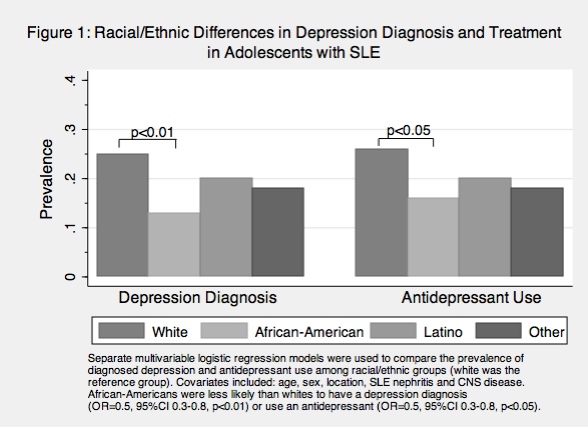Session Information
Date: Sunday, November 8, 2015
Title: Pediatric Rheumatology – Clinical and Therapeutic Aspects Poster I: Lupus, Scleroderma, JDMS
Session Type: ACR Poster Session A
Session Time: 9:00AM-11:00AM
Background/Purpose:
Adolescents with systemic lupus erythematosus (SLE) are at
high risk for depression. Racial/ethnic minorities are
disproportionately affected by SLE, and previous studies suggest a
higher risk of untreated depression in these groups. We aimed to compare the
prevalence of diagnosed depression and treatment between racial/ethnic groups
of adolescents with SLE.
Methods:
We conducted a cross-sectional study using claims data from
the Centers for Medicare and Medicaid Services Medicaid Analytic Extract data
files from 49 states and the District of Columbia. We included adolescents aged
10 to 18 years, with continuous enrollment from January 1, 2006 to December 31,
2007, and a diagnosis of SLE, defined as having >=3 outpatient visit claims
with an ICD-9 primary diagnosis code for SLE of 710.0, each recorded at least
30 days apart. We categorized race/ethnicity as: white, African-American,
Latino and other. We conducted unadjusted and adjusted logistic regression
analyses to compare the following between racial/ethnic groups: 1) depression
diagnoses and 2) antidepressant use. Covariates included: age, sex, urban vs.
rural location, presence of SLE nephritis and central nervous system (CNS)
disease, defined as seizures or stroke.
Results:
We identified 970
adolescents with SLE; 15% were white, 42% African American, 27% Latino and 16%
of other races/ethnicities. The mean age was 14.7 (SD=2.0), 83% were female and
85% were of urban location. Nephritis was present in 36% and CNS disease in
16%. Seventeen percent of the sample had depression diagnosis and 21% used an antidepressant.
In adjusted analyses, African-Americans were less likely than whites to have a depression
diagnosis (OR=0.5, 95%CI 0.3-0.8, p<0.01) or use an antidepressant (OR=0.5,
95%CI 0.3-0.8, p<0.05) (Figure 1). Older adolescents were more likely to be
diagnosed with depression (OR=1.1, 95% CI 1.0-1.2, p<0.01) and use an antidepressant
(OR=1.2, 95% CI 1.1-1.3, p<0.001), as were those with CNS disease (OR=2.9,
95% CI 2.0-4.3, p<0.001).
Conclusion:
In the context of other studies showing under-treatment of
depression in African-American adolescents, our results suggest that
African-Americans with SLE may be at higher risk for under-diagnosis and
under-treatment than adolescents with SLE of other race/ethnicity.
Interventional strategies for depression in adolescents with SLE should address
disparities in mental health care.
To cite this abstract in AMA style:
Knight A, Xie M, Mandell D. Racial and Ethnic Disparities in Depression Diagnosis and Treatment for Adolescents with SLE: Analysis of a National Medicaid Sample [abstract]. Arthritis Rheumatol. 2015; 67 (suppl 10). https://acrabstracts.org/abstract/racial-and-ethnic-disparities-in-depression-diagnosis-and-treatment-for-adolescents-with-sle-analysis-of-a-national-medicaid-sample/. Accessed .« Back to 2015 ACR/ARHP Annual Meeting
ACR Meeting Abstracts - https://acrabstracts.org/abstract/racial-and-ethnic-disparities-in-depression-diagnosis-and-treatment-for-adolescents-with-sle-analysis-of-a-national-medicaid-sample/

